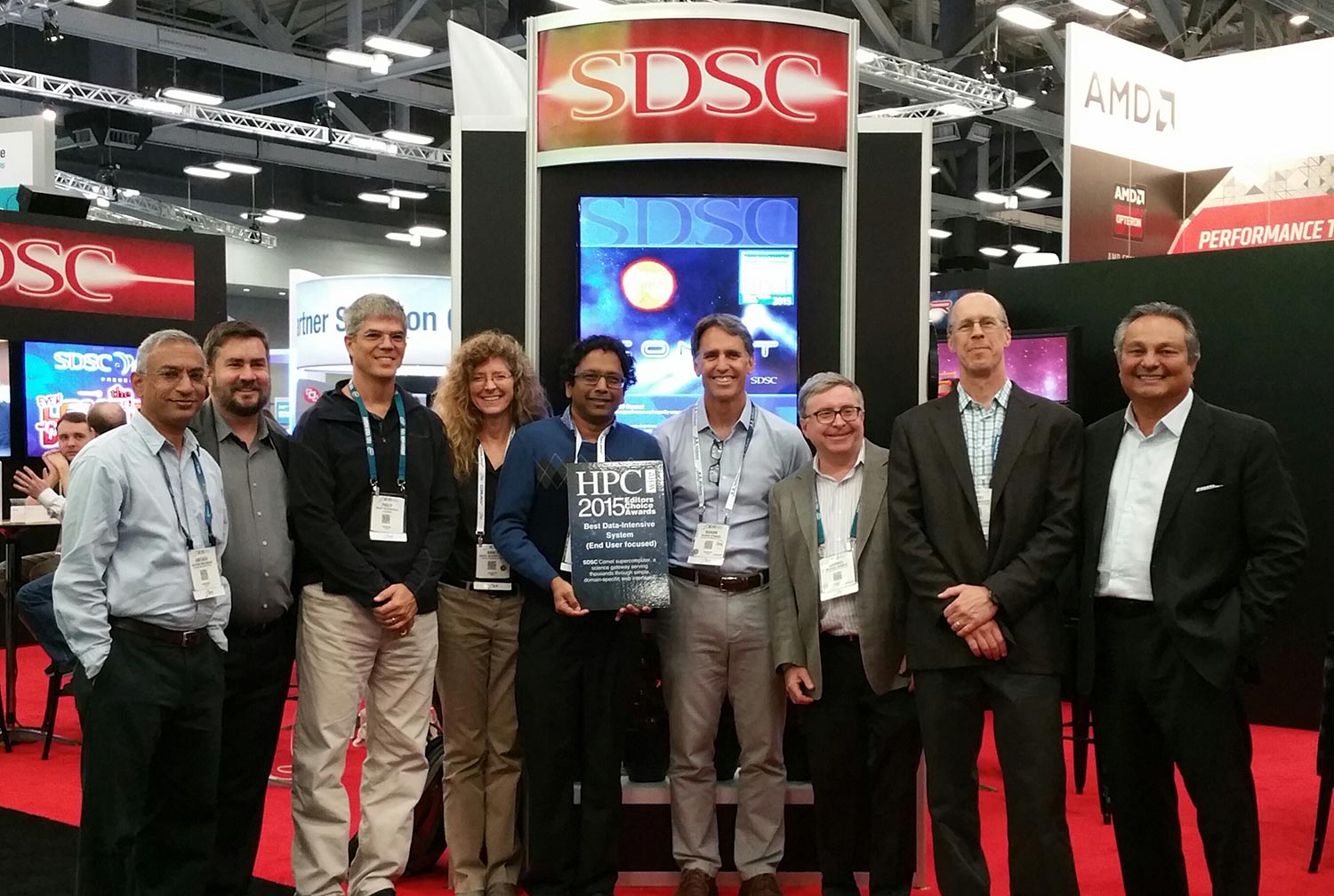SDSC Receives 2015 HPCwire Editors’ Choice Award for ‘Comet’ Supercomputer
Annual Awards Recognize Leaders in the Global HPC Community
Published Date
By:
- Jan Zverina
Share This:
Article Content

SDSC Director Michael Norman (third from right), joins Comet launch team members in accepting HPCwire’s Editors’ Choice award for the Center’s ‘Comet’ supercomputer from HPCwire publisher Tom Tabor (far right) at the Supercomputing 2015 (SC15) conference in Austin, TX. Photo: Cindy Wong, SDSC
The San Diego Supercomputer Center at the University of California, San Diego, is a recipient of this year’s HPCwire and Editors’ Choice Awards for its new Comet supercomputer that entered production earlier this year as a result of a National Science Foundation grant worth nearly $24 million including hardware and operating funds.
The award, for Best Data-Intensive System: End User focused, went to Comet for its role as a science gateway that will serve thousands of researchers through simple, domain-specific web interfaces. The award was presented at the 2015 International Conference for High Performance Computing, Networking, Storage and Analysis (SC15), in Austin, Texas.
“The entire Comet team thanks HPCwire for honoring us with this award,” said SDSC Director Michael Norman, who also is the principal investigator for the Comet project. “I’d also like to recognize Dell, Intel, and Aeon Computing, our project partners. We hit the ground running following a smooth buildout and launch process, and now Comet is serving a wide range of users to help advance scientific discovery.”
Comet is available for use by U.S. academic researchers through the NSF’s eXtreme Science and Engineering Discovery Environment (XSEDE) program, a national collection advanced, integrated digital resources and services. A video about Comet can be viewed here.
The petascale system, capable of conducting two million billion calculations per second, is expected to serve an active research community of more than 10,000 users, mostly via science gateways. Such gateways provide web browser access to applications and data used by specific science communities, and make it possible to run the available applications on supercomputers such as Comet, for quick results, even with large data sets. Browser access offered by gateways also allow researchers to focus on their area of science without having to learn the details of how supercomputers work.
“Comet is already serving as a tremendous resource for the science gateway community,” said Nancy Wilkins-Diehr, an associate director with SDSC and co-director of XSEDE’s Extended Collaborative Support Services. “Its size, scheduling policies, and support for virtualization makes it an ideal platform for this important scientific community.”
The annual HPCwire Readers’ and Editors’ Choice Awards are determined through a nomination and voting process with the global HPCwire community, as well as selections from the HPCwire editors.
“HPCwire readers are among the most informed in the HPC community and these awards are ultimately given to the organizations that are making the greatest impact in advancing technology and humanity itself through high performance computing,” said Tom Tabor, CEO of Tabor Communications, publisher of HPCwire.
More information on these awards can be found at the HPCwire website (HPCwire.com) or on Twitter through the following hashtag: #HPCwireAwards.
Share This:
Stay in the Know
Keep up with all the latest from UC San Diego. Subscribe to the newsletter today.



